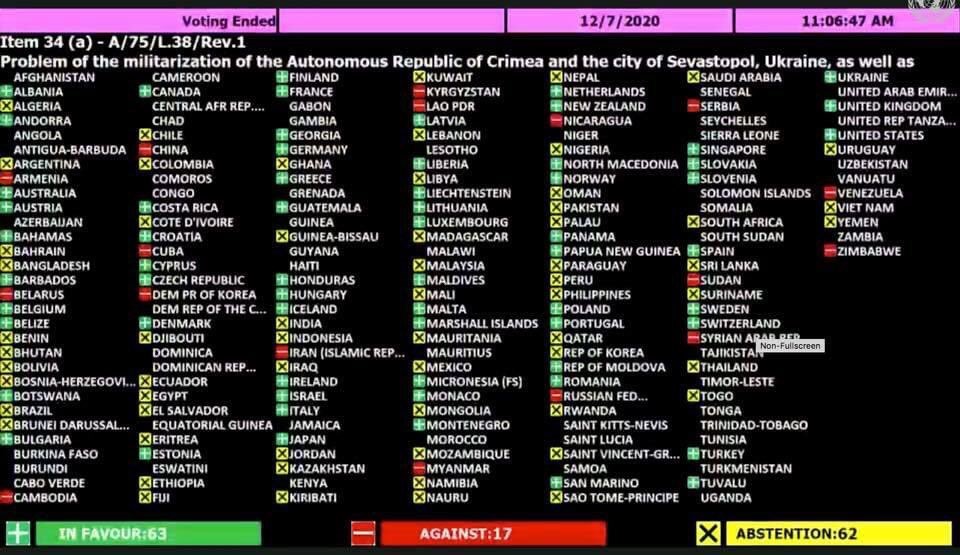Since March 2014, the Ukrainian peninsula of Crimea has been under the occupation of Russia, which had formally annexed the region proclaiming it part of Russia. However, only the closest Russian allies recognized the annexation legitimate, while Ukraine and major Western powers see the peninsula as Ukrainian and have imposed a number of Crimea-related sanctions on Russia.
According to IKDI, the survey took place from 29 July through 4 August 2021 and included face-to-face interviews with 2019 adult respondents aged 18 and up at their places of residence, which included all regions of Ukraine except for those occupied by Russia. The pollster says that the sample was representative of key social and demographic parameters, and the theoretical sampling error doesn't exceed 2.3%.
Crimea's political future
Regardless of their gender and location, the absolute majority of Ukrainians (61%) believe that in the future Crimea should be part of Ukraine. This opinion is shared the most among the people aged 18-29 (67%) and the residents of the western part of Ukraine (73%). Meanwhile, less confident are senior citizens aged 60 and up (54%) and the citizens living in the east (47%). The poll has found that there are only 6% of those who think that Crimea should be part of Russia, with it some 10% of respondents see Crimea as an independent state in the future.
- Read also: 85% of Ukrainians: Crimea is part of Ukraine (2014)
Ukraine's sovereignty over Crimea
As most Ukrainians generally see the future of Crimea in Ukraine, only 43% of respondents believe that Ukraine is going to restore its sovereignty over Crimea one way or another, while other 44% see it as an unlikely or impossible task. Juxtaposing the current figures with the results of the similar polls carried out in 2016 and 2018 shows that with years passing by, the level of confidence goes down: the number of believers in Ukraine's ability to get Crimea back has dropped by 11% as the percentage of non-believers went up by 7%. Ukraine's westerners have the greatest faith in the return of Crimea (61%), while those living in the east of the country are most skeptical with only 31% of them believing that it's possible.
How to get Crimea back
The respondents who believe that Ukraine can bring Crimea back see two most effective ways to achieve this, with the first way being the diplomatic efforts aiming at toughening sanctions against Russia (47%). The second way to return Crimea, according to 46% of the participants of the survey, is implementing reforms that would boost living standards in Ukraine making it more attractive to the residents of Crimea (which is what some politicians preach without any positive example in history, while the examples of South vs North Korea, Georgia vs its Russian-occupied regions, etc, show the opposite: higher living standards don't return the territories, - Ed.).
Some 28% of Ukrainians believe that Ukraine should enhance its military capabilities to be able to liberate Crimea. Only about 12% believe that negotiations with the Russian Federation may be helpful in returning Crimea, while some 13% think that the way to return the peninsula is cut off all the contacts with occupied Crimea and imposing the complete isolation of the region.
Major obstacles to returning Crimea
The poll showed that Ukrainians see the Russian military presence in Crimea as the major factor that makes it impossible to return Crimea, 52% of respondents are of this opinion.
Two other important factors that are a problem for the restoration of the Ukrainian sovereignty over the peninsula are, according to the results of the poll, the negative attitude of Crimean residents towards Ukraine (39%) and the duration of the Russian occupation of Crimea (35%).
- Read also: Russians relocated to occupied Crimea now make up one-third of the population, experts say
Regionally, the opinion that Crimeans' negative attitude towards Ukraine makes the return of the peninsula impossible stands out in the eastern regions with some 50% of respondents supporting this statement.
Crimean Tatars: autonomy and indigenous status
Crimean Tatar national autonomy on the peninsula after the liberation of Crimea from Russian occupation has the support of an absolute majority of respondents (57%), which is 7 percentage points higher than in 2018. The theorized autonomy has the strongest support in the western (66%) and central (64%) provinces, while the residents of southern and eastern regions show a much lower level of support for the Crimean Tatar autonomy (48% and 44% respectively).
Meanwhile, 61% support the recent legislative recognition of the Crimean Tatar people as an indigenous people of Ukraine. Granting Crimean Tatars the indigenous people's status has the greatest support in the western (71%) and the center (68%) of the country, again with the lowest level of support in Ukraine's eastern and southern (49%) regions.
Read the full text of the survey's summary on the website of the Ilko Kucheriv Democratic Initiatives Foundation.
Further reading:
- Ukrainians under 30 unified in their support for Ukraine and the West unlike older generations
- Crimea Platform – mere formality or workable mechanism to recover Ukraine’s peninsula?
- Ukraine recognizes three Crimean peoples as indigenous, infuriating Russia
- Indigenous leader accuses Russia of ethnocide at UN Forum
- Crimea Platform: how the Kremlin tried and failed to marginalize the international summit
- Seven years of occupation of Crimea: human rights activists systematise human rights violations on peninsula
- Documentary: “A struggle for survival of the indigenous people of Crimea”
- Forced migration in Crimea as part of Russia’s ‘hybrid’ strategy
- The quiet front: the battle of identities in occupied Crimea and Donbas
- Most people in occupied Donbas prefer reintegration with Ukraine, new survey shows (2019)








